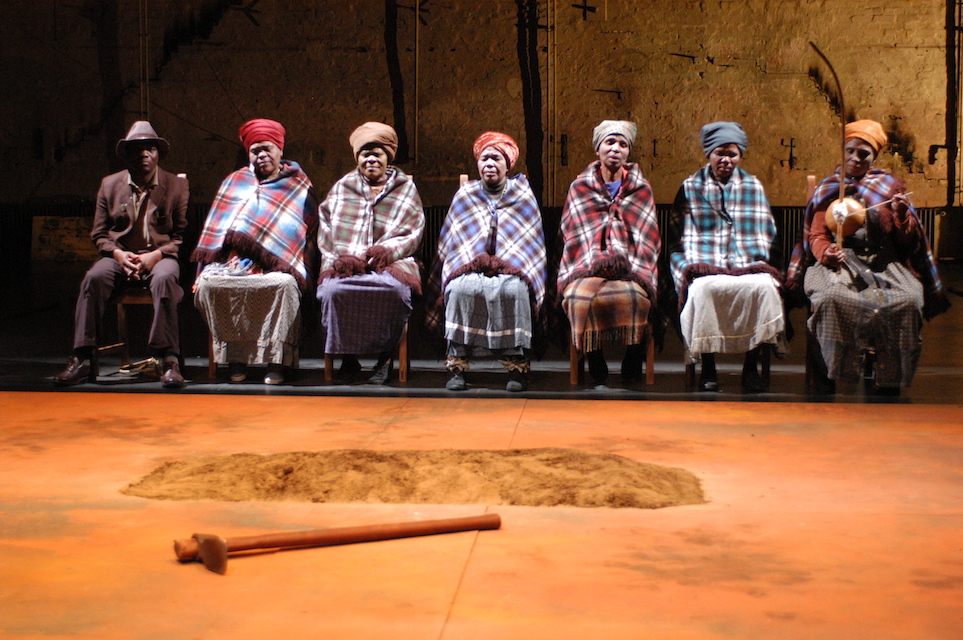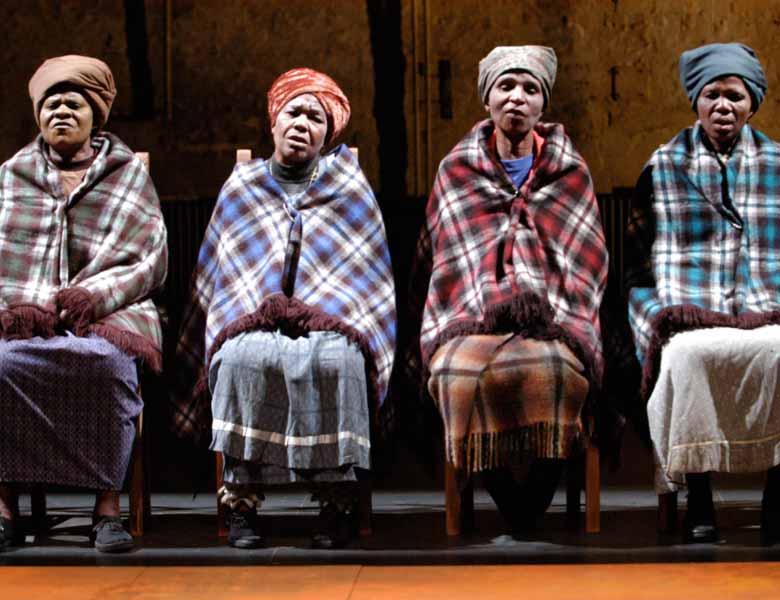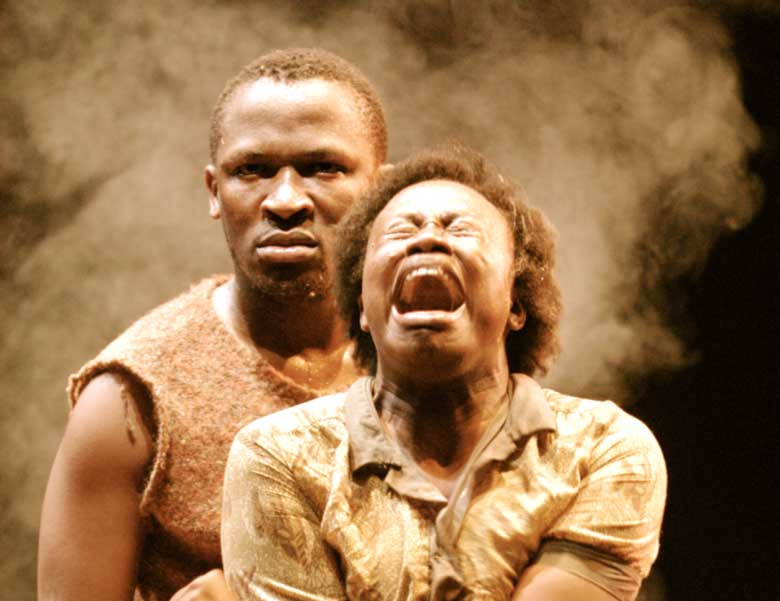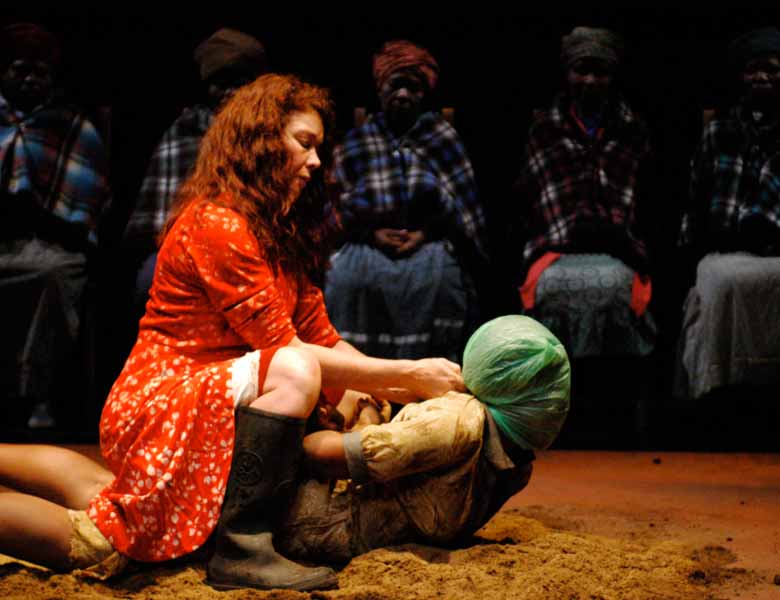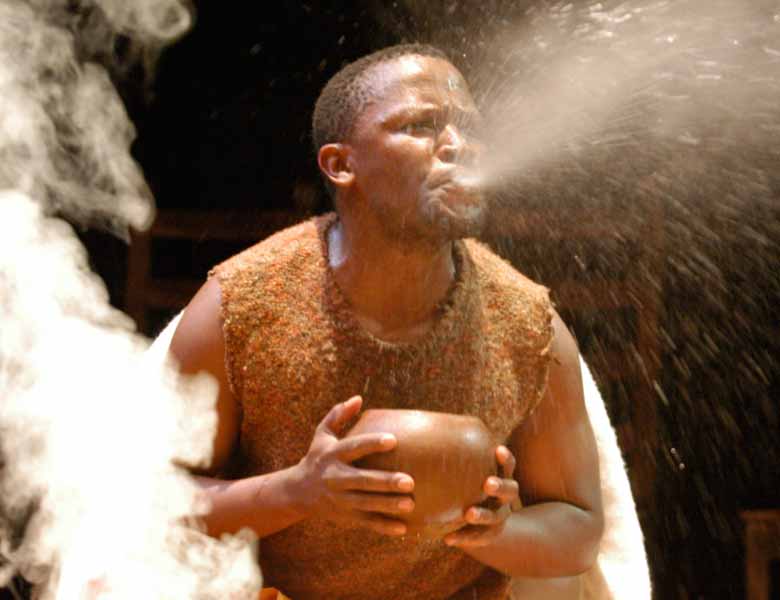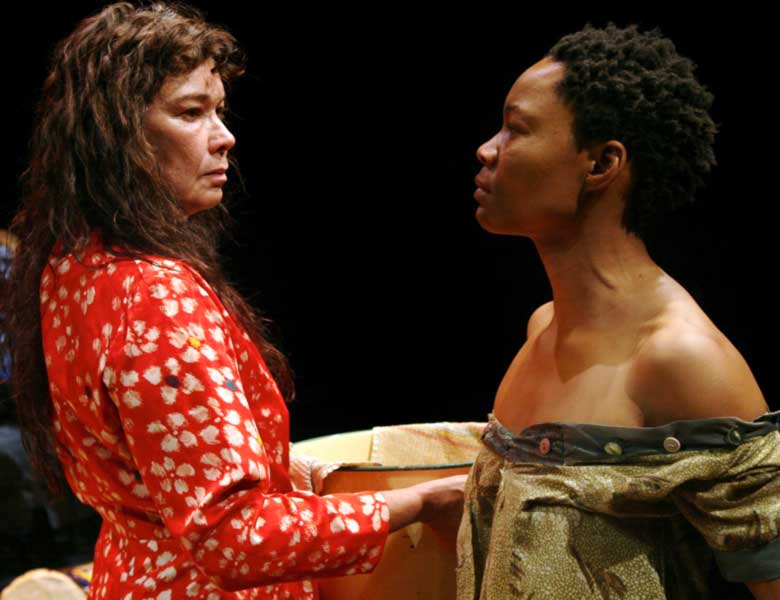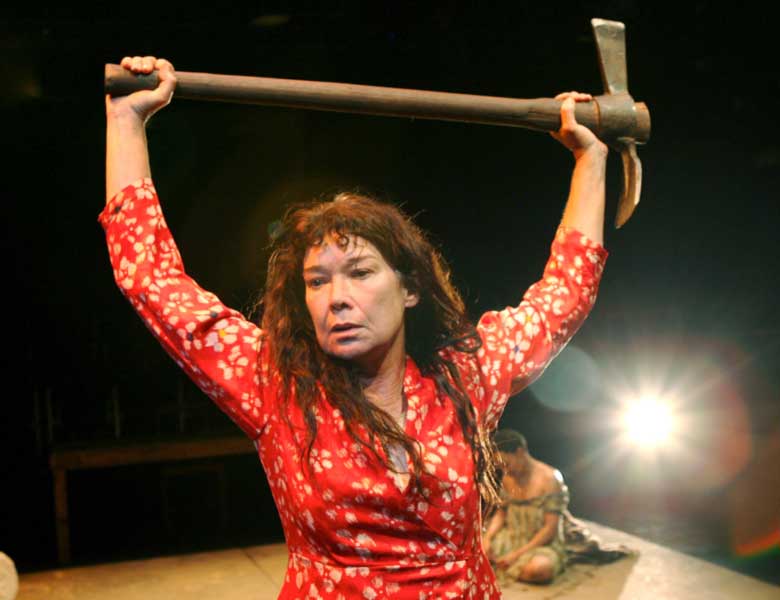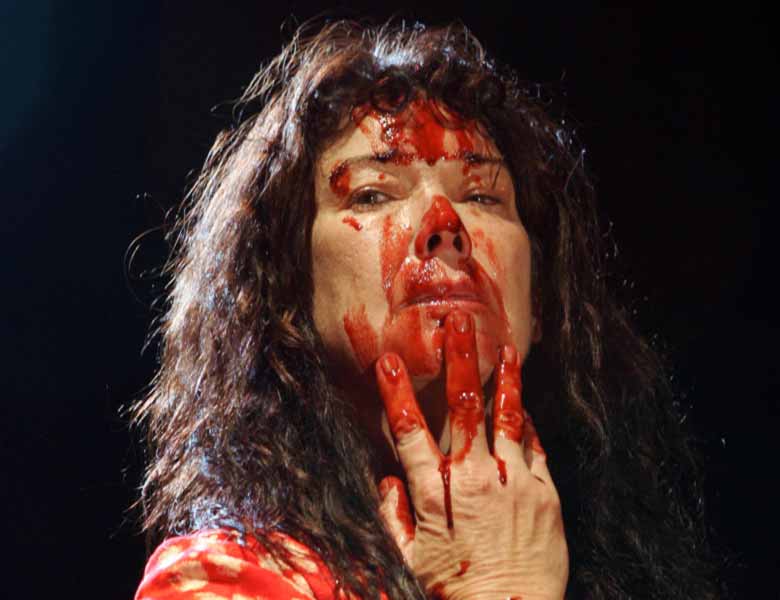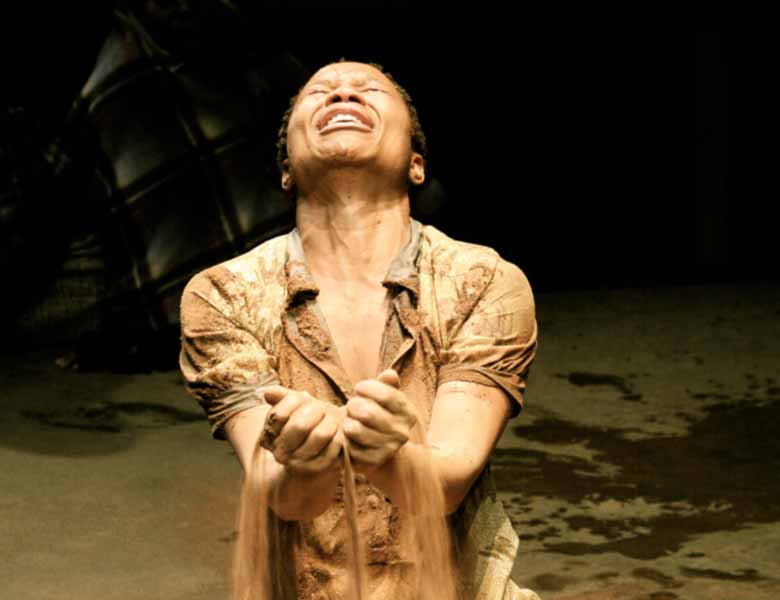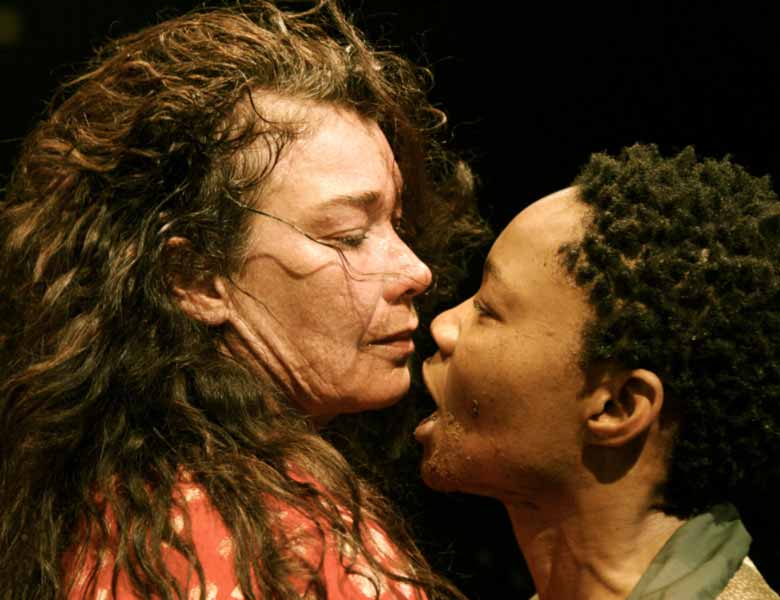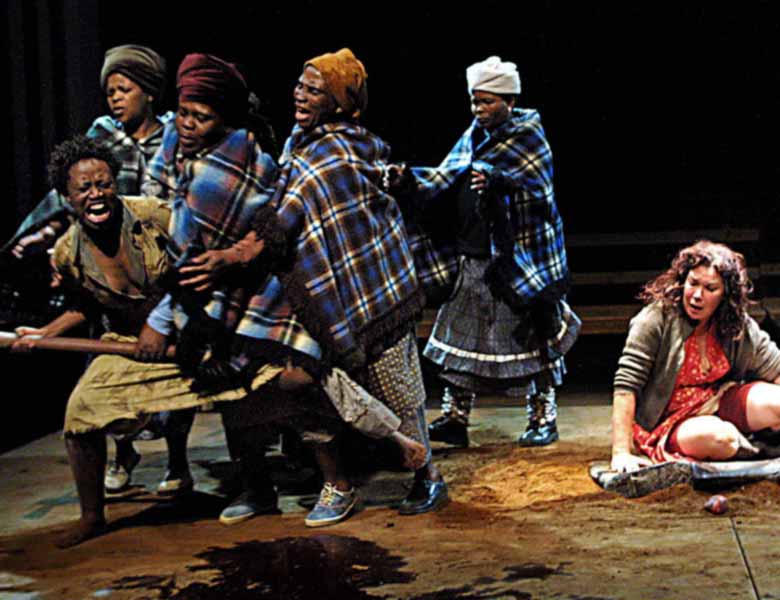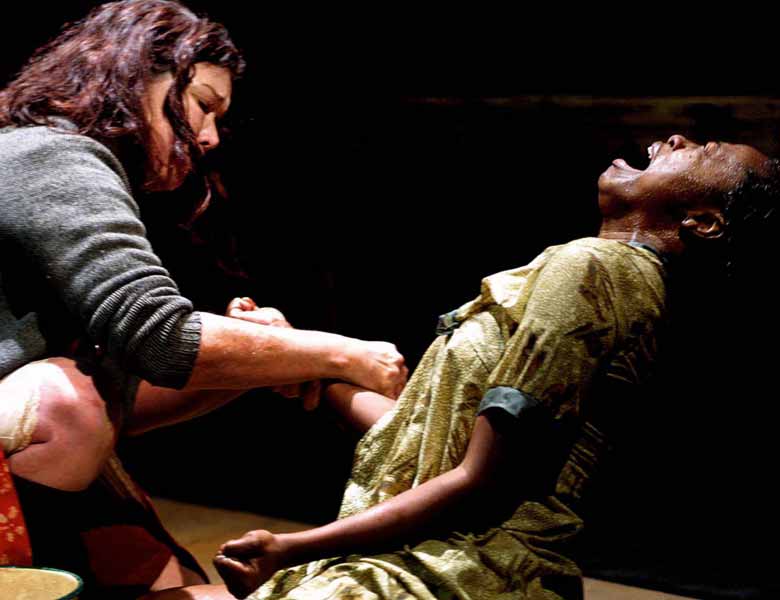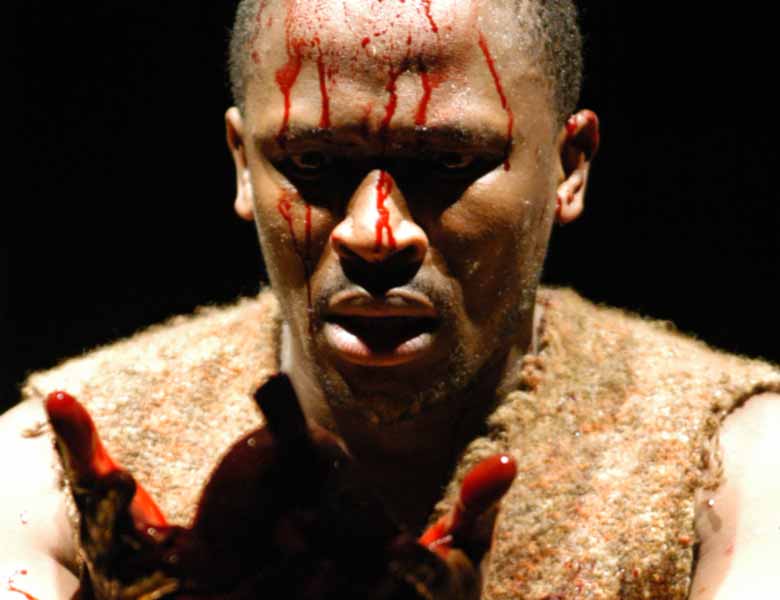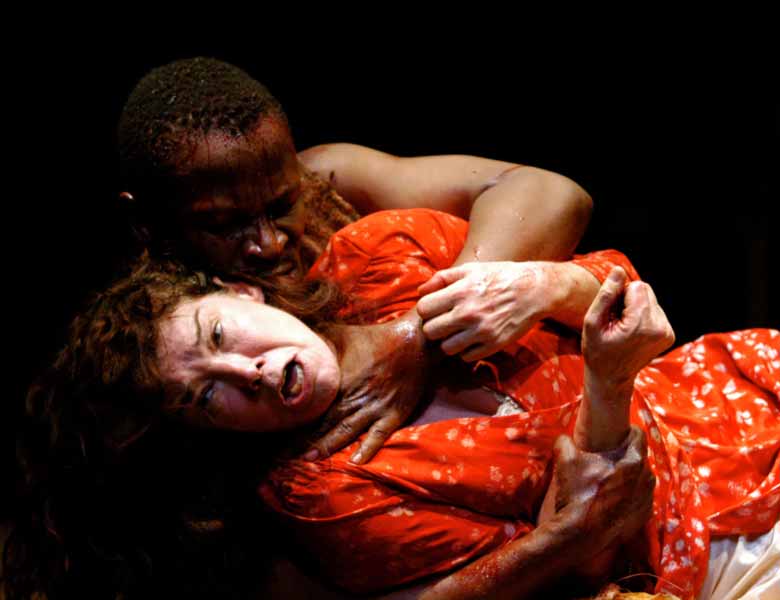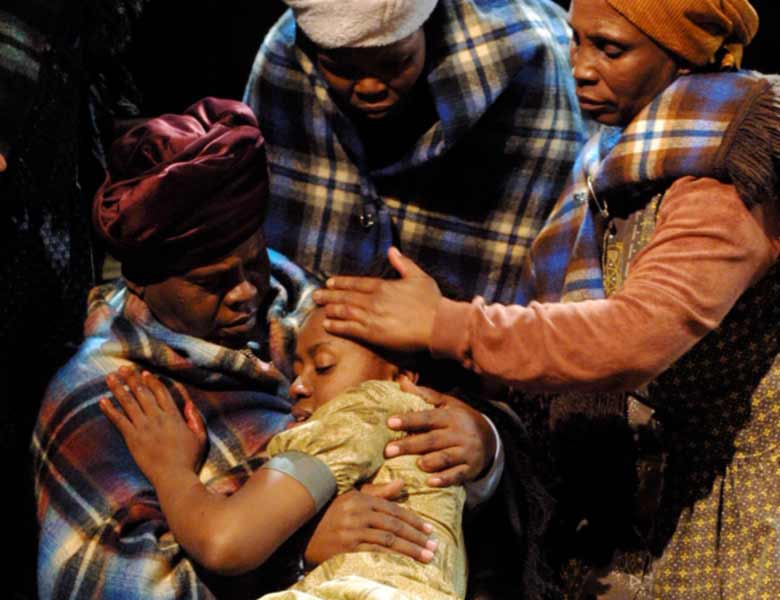MORE INFO ↓
MOLORA
An Adaptation of the Ancient Oresteia Trilogy
Written & Directed by Yaël Farber
Multiple international award winning MOLORA is Yaël Farber's radical adaptation of Aeschylsus's Oresteia Trilogy. Using this ancient text, Farber re-imagines the story of the cursed House of Atreus in the context of Apartheid South Africa's aftermath, and its Truth and Reconciliation Commission. As mother and daughter, perpetrator and survivor, face each other over wooden tables and through microphones - memory falls between two tables of testimony, and we face the past in all its raw brutality and fragility. The ancient Chorus is reinvented in the potent form of the matriarchs who are members of The Ngqoko Cultural - Traditional Xhosa musicians and throat singers. It is Farber's vision, the unrestrained sacrifice of the three actors who form the House of Atreus, and the unearthly presence of this extraordinary Chorus of Xhosa matriarchs - that have brought critical acclaim and continued invitations for MOLORA to be presented around the world.
THE LONDON TIMES
"Raw and Unflinching... This is art from the gut. I cannot recommend it highly enough"
Read the article (PDF file)
TIMEOUT, LONDON
"Most explosive, viscid productions of Aeschylus'Oresteia trilogy imaginable... Farber's direction is seering... Scorching production"
Read the article (PDF file)
THE GUARDIAN, LONDON
"Mesmerizing... All the spare savagery of Greek Tragedy"
Read the article (PDF file)
METRO, LONDON
"Potent symbol of a country"
Read the article (PDF file)
THE STAR, JOHANNESBURG
"Sophisticated theatre in its rawest form... Gut-wrenching stuff... It is Farber's phenomenal ability to tell a story which, in all its simplicity, becomes intensely complex."
Read the article (PDF file)
THE NEW BLACK MAGAZINE, LONDON
"Farber has once again gone to the deep reserve of her resources as a writer and director"
Read the article (PDF file)
BBC OXFORD
"Farber's direction is astounding"
"[The] acting from the cast some of the best I've seen in years... A one of a kind theatrical experience"
Read the article (PDF file)
NEWBURY WEEKLY NEWS
"Yaël Farber is in the premier league of directors. A must-see"
Read the article (PDF file)
THE GAZETTE, MONTREAL
"Simply one of the best productions this critic has ever seen anywhere"
Read the article (PDF file)
AMERICAN THEATRE
"Mesmerizing production by a young auteur."
Read the article (PDF file)
SUNDAY TIMES - JOHANNESBURG
"Gripping and effective meditation on the cycles of revenge... Dazzling artistic vision"
"Farber's work is not embellished with Africanism; it is essentially African"
Read the article (PDF file)
SUNDAY INDEPENDENT - JOHANNESBURG
"Farber has not simply Africanized Aeschylus's play... she dissolves some of the superficial barriers that separate African and European expression"
Read the article (PDF file)
THE BRITISH THEATRE GUIDE
"Passionate, blood-soaked and very moving telling... powerfully played... Not for the faint-hearted... A sense here of how theatre might once have served to define the shape of the world"
Read the article (PDF file)
DAILY INFO OXFORD
"Watch this house rise again and The Farber Foundry at work"
Read the article (PDF file)
OXFORD MAIL
"Challenging and compelling drama. It should not be missed"
Read the article (PDF file)
ROGUES & VAGABONDS
"Electrifying and evocative... Farber has directed a stunning play, full of moments of great beauty and resonance... Theatre at its most intense and inspiring"
"Its heart beats with a luminous humanity"
Read the article (PDF file)
TOURS
ALVIN AILEY, New York, USA 2011
DUKE UNIVERSITY, North Carolina, USA 2010
PLACE DES ARTS, Montreal, Canada 2009
THE BARBICAN, London UK 2008
GALWAY ARTS FESTIVAL, Galway Ireland 2008
DIMITRIS HORN THEATRE, Athens, Greece 2008
CLARICE SMITH PERFORMING ARTS CENTER, Maryland, USA 2008
CLARICE SMITH PERFORMING ARTS CENTER, Maryland, USA 2008
ANNENBERG CENTER, Philadelphia, USA 2008
THE OXFORD PLAYHOUSE, Oxford, UK 2008
DEN HAAG REGENTES, The Hague, Holland 2008
ROTTERDAM SCHOUWBURG, Rotterdam, Holland 2008
UTRECHT SCHOUWBURG, Utrecht, Holland 2008
BREDE CHASSE, Brede, Holland 2008
AMSTERDAM KIT, Amsterdam, Holland 2008
HELMOND SPEELHUIS, Helmond, Holland 2008
LEIDEN SCHOUWBURG, Leiden, Holland 2008
THE OXFORD PLAYHOUSE, Oxford, UK 2007
THE MARKET THEATRE, Johannesburg South Africa 2007
PRODUCTION TEAM
Adaptor & Director: YAËL FARBER
Ensemble:
DOROTHY ANN GOULD
JABULILE TSHABALALA
SANDILE MATSHENI
THE NGQOKO CULTURAL GROUP’S:
TSOLWANA. B. MPAYIPHELI
TANDIWE LUNGISA
NOKHAYA MVOTYO
NOFENISHALA MVOTYO
NOPASILE MVOTYO
NOSOMETHING NTESE
NOGCINILE YEKANI
Assistant Director: YANA SAKELARIS
Set Design: LARRY LEROUX & LEIGH COLOMBICK
Costume Design: NATALIE LUNDON & JOHNY MATOLE
Lighting Design: MICHAEL MAXWELL
Music & Song arrangements: THE NQGOKO CULTRAL GROUP
"This thing called reconciliation… If I am understanding it correctly… if it means this perpetrator, this man who has killed my son, if it means he becomes human again, this man, so that I, so that all of us, get our humanity back… then I agree, then I support it all."
[Cynthia Ngwenyu, mother of one of the murdered Gugulethu 7, when facing her son's state-sanctioned murderer at the Truth & Reconciliation Commission, South Africa]
In the aftermath of South Africa's transition into democracy in 1994, the world held its collective breath in anticipation of a civil war that would surely unleash the rage of generations shattered by the Apartheid regime. South Africa defied expectations, however - lighting the way forward for nations trapped in quagmires of revenge. Despite the praise Nelson Mandela received from 'First World' leaders for heralding great restraint through this transition in our troubled land, nothing could convince those same leaders to check their own ancient eye-for-an-eye, knee-jerk response and their resulting offensives of 'Shock and Awe' on the women and children of Baghdad. South Africa's relatively peaceful transformation was an extraordinary exception in our vengeful world. But such a journey is neither simple nor easy, and has little to do with the reductive notions of a miraculously forgiving Rainbow Nation or 'turning the other cheek'. In the epic eye of South Africa's storm, it was not the gods – not any deus ex machina – that delivered us from ourselves. It was the common everyman and everywoman who, in the years following democracy, gathered in modest halls across the country to face their perpetrators across a table, and find a way forward for us all.
The ancient Oresteia trilogy tells the story of the rightful heirs to the House of Atreus, dispossessed of their inheritance. Forced to live as a servant in the halls of her own father's house, Elektra waits for her brother Orestes to return from exile to the land of his ancestors and take back what is rightfully theirs. The premise of this ancient story was striking to me as a powerful canvas on which to explore the history of dispossession, violence and human-rights violations in the country I grew up in. I had long been interested in creating a work that explores the journey back from the dark heart of unspeakable trauma and pain. In the long nights following the devastating attack on the World Trade Centre, amid the grief, recriminations and the Bush administration's indiscriminate wielding of revenge, a fine white powdery substance gently floated down upon heart-broken New York. MOLORA is an examination of the spirals of violence begat by vengeance, and the breaking of such cycles by the ordinary man.
Our story begins with a handful of cremated remains that Orestes delivers to his mother's door. From the ruins of Hiroshima, Baghdad, Palestine, Northern Ireland, Rwanda, Bosnia, the concentration camps of Europe and modern-day Manhattan – to the remains around the fire after the storytelling is done…
MOLORA [the Sesotho word for 'ash'] is the truth we must all return to, regardless of what faith, race or clan we hail from. For when fire meets fire, it is only ash that will remain.
Yaël Farber
THE NGQOKO CULTURAL GROUP
The Ngqoko Cultural Group is a body of men and women committee to the indigenous music, songs and traditions of the rural Xhosa communities. Hailing from the humble rural town of Lady Frere in South Africa, the group was first formed in 1980. A single bow player and her daughter were maintaining the practice of playing music together, when a German visitor, Dawie Dargie, began working with the Xhosa musicians with the help of Tsolwana Mpayipheli as translator. In 1983 Mpayipheli, discovered several other musicians who joined the group. They have since established a reputation as guardians of the rural Xhosa culture, maintaining the survival and presence of indigenous South African music and instruments.
In Molora the device of the ancient Greek Chorus is radically reinvented in the form of a deeply traditional, rural Xhosa aesthetic. Farber chose to collaborate with The Ngqoko Cultural Group with the intention of rediscovering the original power of the device of the Chorus in ancient Greek theatre. In her quest to find a group that could represent the weight and conscience of the community – as she believes is the Chorus' purpose – she happened upon the unearthly sound of the Ngqoko Group's UMNGQOKOLO (Split- Tone Singing). Farber travelled to the rural Transkei to meet with the women, where she told them the story of the Oresteia. Their reaction to the story was deeply felt and met with much discussion on the moral implication of killing your own mother. Farber instantly knew she had found the Chorus to this new Oresteia.
Trained in this ancient art of singing, these women have been taught from an early age, the skill of creating this vocal phenomenon, as well as being masters of the ancient musical instruments that are an intrinsic part of their everyday lives in the rural Transkei. The mouth bows, calabash bows, mouth harps and milking drums form an array of traditional musical instruments that they – as Chorus – play in accompaniment to the text of Molora. The sounds of these unique Xhosa artists lend a haunting texture of sound, which is unfamiliar to most modern ears, and evokes a deeply emotional accompaniment to the work.
The envisaging of the Chorus as a group of 'ordinary' African women provides the context of the Truth Commission, which witnessed thousands of such 'ordinary' folk gathering in halls across South Africa to hear the details of a loved one's death at the hands of the State. The individuals that constitute the Ngqoko Cultural Group represent, in this context, the unique grace and dignity that was evident in the common man who chose a different path for South Africa. Within the Ngqoko group are two spiritual diviners who are trained in the channeling of ancestral powers. While these women are restrained in their use of authentic trance on stage, their authority in spiritual conduct allows a moment in which the audience may experience a deep participation in a prayer to our ancestors for an end to the cycle of violence in South Africa – and indeed the world.
Photos: Christian Enger & Ruphin Coudyzer

